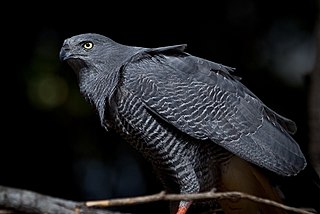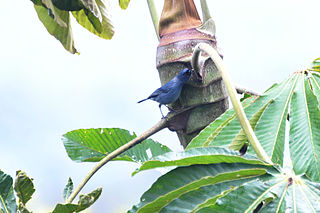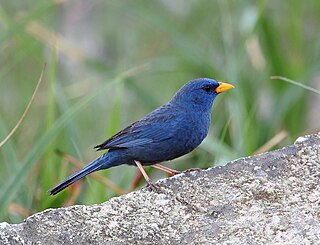
The snow goose is a species of goose native to North America. Both white and dark morphs exist, the latter often known as blue goose. Its name derives from the typically white plumage. The species was previously placed in the genus Chen, but is now typically included in the "gray goose" genus Anser.

The white-bellied drongo is a species of drongo found across the Indian Subcontinent. Like other members of the family Dicruridae, they are insectivorous and mainly black in colour, but with a white belly and vent. Young birds are, however, all black and may be confused with the black drongo, which is smaller and more compact in appearance. The subspecies found in Sri Lanka has white restricted to the vent.
A hyperaccumulator is a plant capable of growing in soil or water with very high concentrations of metals, absorbing these metals through their roots, and concentrating extremely high levels of metals in their tissues. The metals are concentrated at levels that are toxic to closely related species not adapted to growing on the metalliferous soils. Compared to non-hyperaccumulating species, hyperaccumulator roots extract the metal from the soil at a higher rate, transfer it more quickly to their shoots, and store large amounts in leaves and roots. The ability to hyperaccumulate toxic metals compared to related species has been shown to be due to differential gene expression and regulation of the same genes in both plants.

The African rail is a small wetland bird of the rail family that is found in eastern and southern Africa.

The crane hawk is a species of bird of prey in the family Accipitridae. It is monotypic within the genus Geranospiza.

The typical falconets, Microhierax, are a bird of prey genus in the family Falconidae. They are found in southeast Asia and the smallest members of Falconiformes, averaging about 15 cm (5.9 in) in length and 35 g (1.2 oz) in weight. The smallest members of the genus are the relatively widespread black-thighed falconet, and the white-fronted falconet on the island of Borneo.

The blue korhaan or blue bustard is a species of bird in the family Otididae which is native to South Africa. Its call is a series of frog-like croaks, usually uttered in flight. Its natural habitat is plateau grassland, dry shrubland, arable land and pastureland. Its preferred habitat is one with short grassland and flat topography.

The bluish flowerpiercer is a species of bird in the family Thraupidae. It is found in humid montane forest in Bolivia, Colombia, Ecuador, Peru and Venezuela.

The blue finch or yellow-billed blue finch is a species of small bird. Although it was long classified in the bunting family Emberizidae, or the cardinal family Cardinalidae, more recent molecular studies have shown it fits comfortably in the Thraupini tribe within the family Thraupidae.

The blue jewel-babbler is a species of bird in the family Cinclosomatidae. It is found in New Guinea. Its natural habitat is subtropical or tropical moist lowland forests.

The double-collared seedeater is a species of bird in the family Thraupidae.

Psilocybe caerulescens, also known as landslide mushroom, is a psilocybin mushroom having psilocybin and psilocin as main active compounds. Along with Psilocybe mexicana and Psilocybe aztecorum, it is one of the mushrooms likely to have been used by the Aztecs and is currently used by Mazatec shamans for its entheogenic properties.

The blue-winged grasshopper, Oedipoda caerulescens, is a grasshopper in the genus Oedipoda.

Pelmatellus is a genus of ground beetles in the family Carabidae. There are at least 20 described species in Pelmatellus.
Euphaedra caerulescens is a butterfly in the family Nymphalidae. It is found in the Central African Republic, the Democratic Republic of the Congo, Uganda and possibly Ethiopia.
Pelmatellus andium is a species of ground beetle in the genus Pelmatellus.
Pelmatellus balli is a species of ground beetle in the genus Pelmatellus.

Phytoecia caerulescens is a species of beetle in the family Cerambycidae. It was described by Scopoli in 1763, originally under the genus Leptura. It has a wide distribution in Europe, and has been introduced into Australia. It feeds on Echium vulgare, Lappula squarrosa, Anchusa officinalis, Lithospermum officinale, and Cynoglossum officinale.
Pelmatellus obtusa is a species of ground beetle in the family Carabidae.













